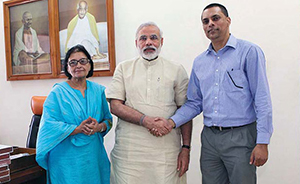Google Pay to tap into 12 million kirana stores in India
Google Pay which reported 55 million monthly ...
According to an Assocham-PWC study, digital payments in India will more than double to $135.2 billion in 2023 from $64.8 billion this year with a compounded annual growth of 20.2 per cent. With the spurt in smart-phone users (the country has over 450 million smart-phone users), digital payments and e-wallet companies are in for some fierce competition and with WhatsApp Pay arriving soon, the game will only become intense.
Google Pay currently has over 3,000 online merchants including Zomato, BookMyShow, Swiggy, RedBus and others in its kitty while it is accepted at over 200,000 offline stores across 3,500 towns and cities. Some of the leading names include Reliance Stores and Vishal Mega Mart, and others. Google Pay (as of May) had $95 billion in money value passing through the channel, at an annualized run rate (ARR) level. According to Mr Kenghe, the digital payments landscape in India has changed in the last two-three years, especially with the growing smart-phone use base.
“In the last two years, instant bank-to-bank transfers via UPI have become the preferred form of payment for millions of Indians, with many users adopting digital payments for the first time,” he said. Google Pay has already made inroads into smaller towns and two-third of its business in India is coming from such markets. To keep the transactions extra-secure, Google Pay now sends app notifications as well as SMSes to inform users each time they receive a collect request to highlight that approving the request will deduct money from their bank accounts.
“We are mindful that at Google Pay, users are entrusting us with their most sensitive asset - their money. We are conscious of the responsibility that comes with this trust,” Mr Kenghe noted. Google Pay uses Machine Learning (ML)-based scam prevention models, and also displays explicit “scam” or “stranger” warnings if a user receives a request from someone suspicious or not in their contacts. “The whole idea is to empower our users in India not just with making payments but to do that in a seamless and secure way,” the Google Pay senior executive added.











Comments.